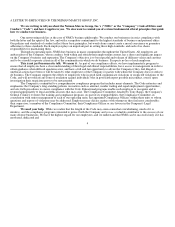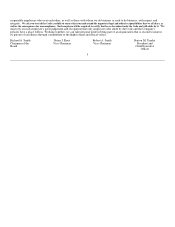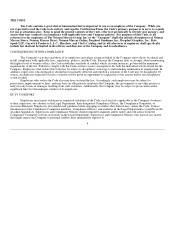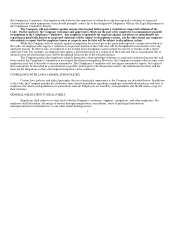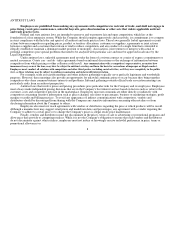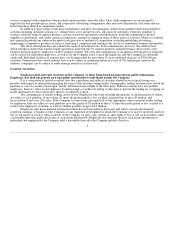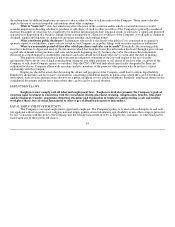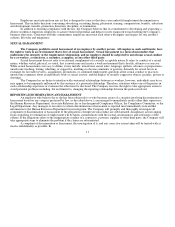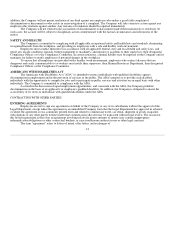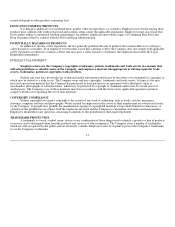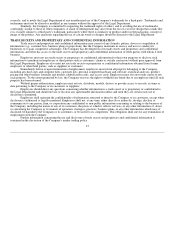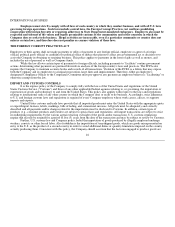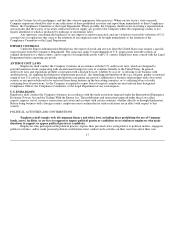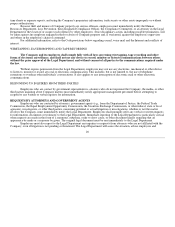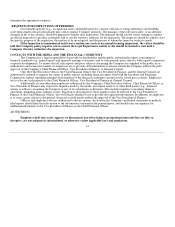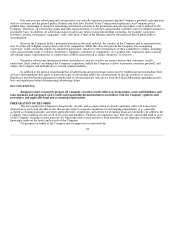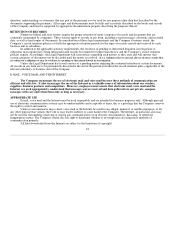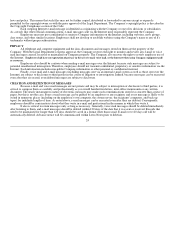Neiman Marcus 2002 Annual Report Download - page 151
Download and view the complete annual report
Please find page 151 of the 2002 Neiman Marcus annual report below. You can navigate through the pages in the report by either clicking on the pages listed below, or by using the keyword search tool below to find specific information within the annual report.
coated with paint or other products containing lead.
FOOD AND COSMETIC PRODUCTS
It is illegal to adulterate or to misbrand meat, poultry, other food products, or cosmetics. Employees involved in buying these
products must confirm with vendors that food and cosmetic items satisfy the applicable regulations. Employees must also ensure that
food vendors adhere to nutritional labeling requirements. In addition, employees must obtain copies of Continuing Pure Food and
Drug Guarantees filed by vendors with the Food and Drug Administration.
POTENTIALLY HAZARDOUS PRODUCTS
In addition to specific safety regulations, the law generally prohibits the sale of products that contain defects or could pose
safety hazards to consumers. If an employee ever becomes aware that a product sold by the Company does not comply with applicable
safety regulations or otherwise contains a defect that may pose a safety hazard to consumers, the employee must notify the Legal
Department immediately.
INTELLECTUAL PROPERTY
Employees must use the Company's copyrights, tradenames, patents, trademarks and trade secrets in a manner that
will safeguard them as valuable assets of the Company, and employees must not misappropriate or infringe upon the trade
secrets, trademarks, patents or copyrights works of others.
Federal and state laws govern the use of material and/or information which may be the subject of a trademark or copyright, or
which may be treated as a trade secret. The Company owns and uses copyrights, trademarks and trade secrets. At times it also may
have in its possession material that the Company has purchased or used pursuant to an agreement with a third party (such as
merchandise, photographs or advertisements), which may be protected by copyright or trademark and/or may be a trade secret of
another party. The Company's use of these materials must be in accordance with the terms of any applicable agreement and must
comply with the laws regulating the use of such materials.
COPYRIGHT COMPLIANCE
Federal copyright laws grant a copyright to the creator of any work of authorship, such as books, articles, magazines,
drawings, computer software and photographs. Works created by employees in the course of their employment are owned exclusively
by the Company. Copyright laws prohibit the unauthorized copying of copyrighted materials except under limited circumstances. A
violation of this prohibition can subject both the employees involved and the Company to substantial civil and/or criminal penalties.
Employees should direct any questions concerning exceptions to this prohibition to the Legal Department.
TRADEMARK PROTECTION
A trademark is a word, symbol, name, device or any combination of these things used to identify a product or line of products
or services and to distinguish them from the products and services of other companies. The Company owns a number of trademarks
which are well recognized by the public and are extremely valuable. Employees must be vigilant to protect the Company's trademarks,
to use the Company's trademarks
14


